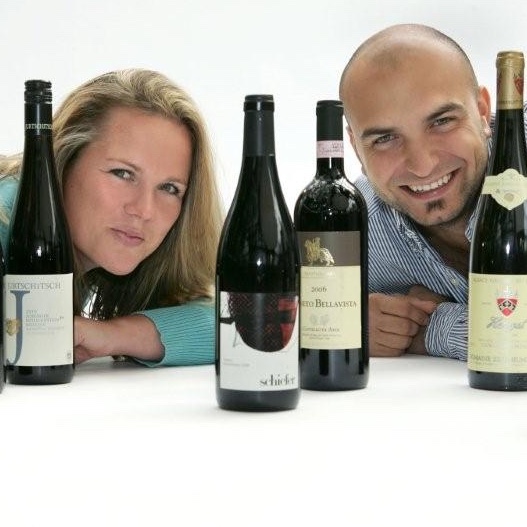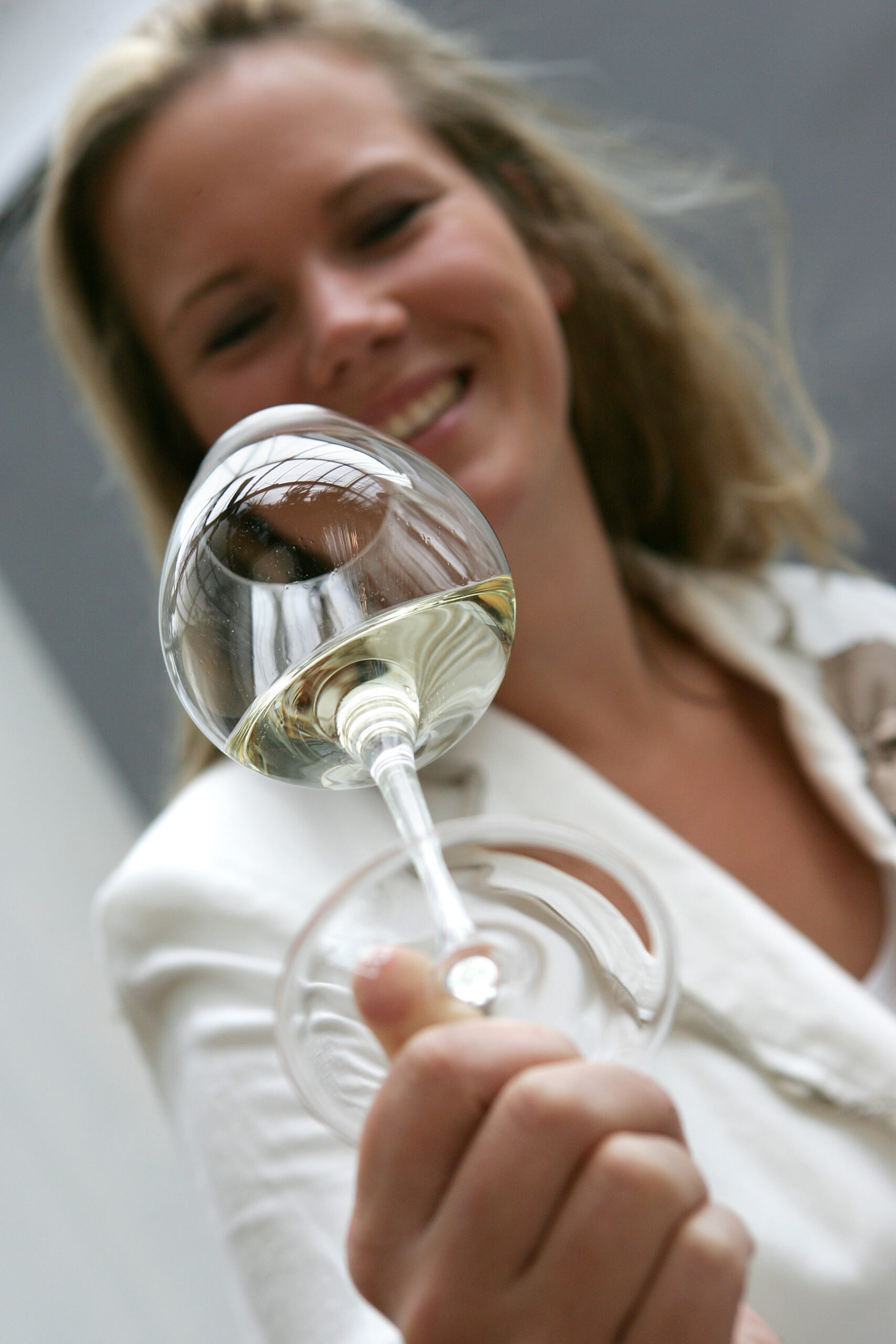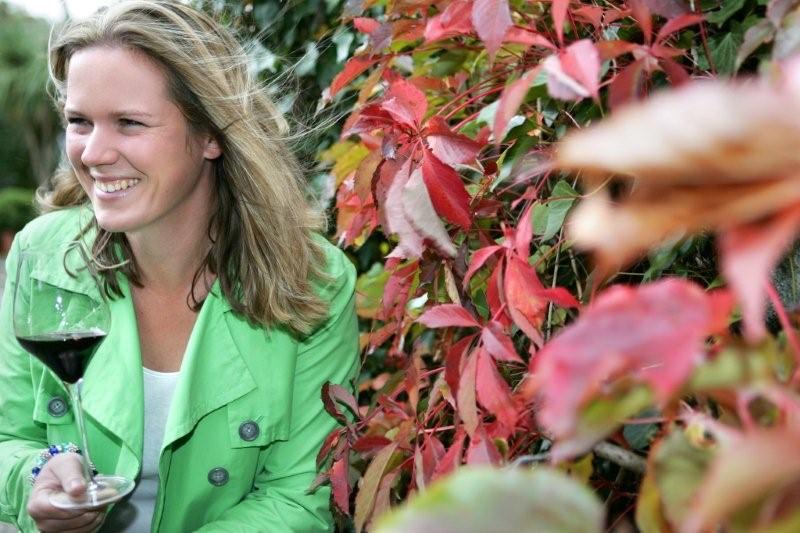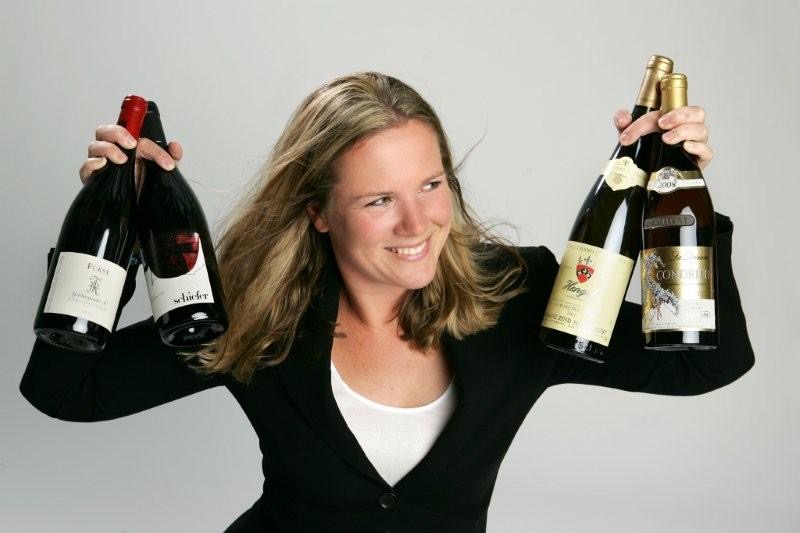Julia Klüber and Paul Truszkowski – Wineadventures & Schluck Magazin

Julia Klüber and Paul Truszkowski are the creative minds behind Wineadventures and the indie wine magazine Schluck. We talked to Julia about her passion for wine and, of course, about sustainability and the most important trends in the wine industry.
What is behind the exciting-sounding name Wineadventures?
As an agency for branding and communication, we accompany wineries and wine regions holistically in all disciplines of marketing. Across all media. Wine marketing off the beaten track is our daily adventure. We tell stories about the origin of a wine, its taste and its winemaker: stories that touch and stay in the memory. And in everything we do, we do not feel and communicate wine as elitist. We make wine tangible for everyone with all their senses.
What distinguishes you from other agencies when it comes to wine communication?
As wine experts, we speak the language of winegrowers, but also that of wine merchants and restaurateurs. We ourselves have worked in all kinds of steep vineyards and in wine buying and selling. That’s why we know exactly what a winegrower wants, as well as what his customers want, regardless of whether they are wine professionals or wine lovers. This know-how ultimately led to the creation of Wineadventures.
Secondly, our networking in the German-speaking wine and gourmet culture scene: we have a very good and personal connection to many sommeliers, retailers and restaurateurs. Of course, Berlin also plays a big role as our location and adopted home. We live here in the coolest city of Europe! Trends with charisma are established here. No other city offers so many creative possibilities. And Berlin is also a big, colourful culinary playground. Everything is constantly on the move here. Just like the wine and us! (laughs)
How would you describe this movement in the wine industry? What trends are emerging?
Many people are getting a taste for it more and more, after the organic boom. This “generic organic” is only the basis. The question is rather “what comes after organic”? In the future, it must be more about social fairness in addition to sustainable organic farming. We cannot have the best organic vegetables from the nearby field brought to the 6th floor by starving Amazon employees. All people in the value chain must be paid fairly, and for that we simply have to pay more.
The new pleasure bohemians are placing more and more value on quality, transparency and credibility. Where does the wine come from? Under what conditions and how sustainably is it produced? What is the attitude of the winemaker? Similar to artisan products, for example cheese, bread or sausage, the trend is towards genuine, ethically and fairly produced wines: artisanal, often biodynamically produced wines. At the same time, almost extinct grape varieties and traditional production methods (such as the hip Pet-Nats, which originated with the méthode ancestrale and date back to early 16th century France) are experiencing a revival.
And more and more people want to experience good wine or cheese, not just consume it. At the weekly market, at the vintner’s, at the wine merchant’s or at the favourite restaurant on the corner. At the same time, people are also becoming more eager to experiment. The trend towards wine-food pairing makes people curious and eager to discover new wines and flavour combinations. The “regionality” megatrend is also noticeable in wine: German wine is becoming increasingly popular. And while the people of Munich, for example, like to drink wines from the Alpine region, wines from Saxony and Brandenburg are increasingly being served in Berlin.
Last but not least, the topic of health and well-being is establishing itself as a megatrend. More and more people are giving up alcohol, but not taste and enjoyment. Gastronomy must adapt to this trend. The wine list will then become a drinks menu with a selection of non-alcoholic alternatives, such as special juices or self-fermented drinks based on kombucha or kefir. The wine lists of the future will also list more and more natural wines. Also a big trend, not only here, but all over the world.
„Of course, Berlin also plays a big role as our location and adopted home. We live here in the coolest city of Europe! Trends with charisma are established here. No other city offers so many creative possibilities. And Berlin is also a big, colourful culinary playground. Everything is constantly on the move here. Just like the wine and us!“
Thank you for this detailed insight. What trends are you observing among your clients?
We notice that something is moving in our still very traditional industry. Many clients have more and more courage to go new ways. The trend towards online marketing is now also emerging in our industry (laughs), especially content and influencer marketing are becoming more and more important. In all of this, it is more and more about an exciting narrative. No matter whether it’s a wine region or a wine brand. Only well-told stories inspire. A nice development!
In addition, more and more clients are more concerned with their visual and content repositioning. The pandemic is forcing them to reposition themselves. Wine regions that have understood this will be perceived in a much more relevant way in the future, which in turn will have a positive effect on the communication and distribution of their producers.
How do you sensitise your customers to manage or communicate more sustainably and how can sustainability be anchored in the minds of their target groups?
Many clients have realised that the more biodiversity there is, the more resilient their vineyards are. Today, they are much more intensively concerned with this topic. The young generation of winegrowers in particular exchange ideas a lot. Global.
Sustainability also means sensitising our customers to build long-term distribution partnerships – not just getting rid of x pallets quickly somewhere.
Why did you become a member of Die Gemeinschaft?
For us, Die Gemeinschaft means conversation, exchange, togetherness, future. Our industry, the wine and luxury culture industry, thrives on community, conviviality and togetherness. And wine is a drink that only unfolds its true magic when you drink it in community and are willing to share it with others.
Of course, we also share the vision of this community, which shares its knowledge and values in an inspiring way. We appreciate the great network: the many people from different fields who inspire, question, inspire to look beyond one’s own nose and wine glass, who have the big picture in mind. With this collaboration, we also want to connect winemakers and farmers more with the urban wine world outside and make the topic of wine enjoyment tangible and tangible. Because although more and more people are interested in wine, many are still afraid of it. For us, the way out of the elitist ivory tower means linking wine with other topics. Fun topics like design, architecture and travel. And, of course, telling stories about inspiring people. Because anyone who has experienced winemakers and farmers, artists and creatives and visited them in their refuge usually has impressive, formative encounters. These encounters and the resulting stories are of substance in our hectic, increasingly digital world. They ground us and give us back a piece of authenticity.
„For us, Die Gemeinschaft means conversation, exchange, togetherness, future. Our industry, the wine and luxury culture industry, thrives on community, conviviality and togetherness. And wine is a drink that only unfolds its true magic when you drink it in community and are willing to share it with others. {…} And, of course, telling stories about inspiring people. Because anyone who has experienced winemakers and farmers, artists and creatives and visited them in their refuge usually has impressive, formative encounters. These encounters and the resulting stories are of substance in our hectic, increasingly digital world. They ground us and give us back a piece of authenticity.“
What does sustainable wine culture mean to you?
Vineyards that are managed gently and the preservation and promotion of biodiversity. A change from radical, industrial mass production and the profit-oriented call for ‘faster, more efficient, more’ to ‘less is more, in harmony with nature’, supported by forward-looking technologies.
For me, sustainable wine culture also means giving almost forgotten grape varieties a chance again and saving them from extinction, but also being open to new technologies and new breeds, such as fungus-resistant varieties (PIWIs). For all this, we also need more biodiversity in gastronomy: chefs, sommeliers and restaurateurs as ambassadors of a new diversity on our plates and in our wine glasses. And of course, the component of social fairness that I mentioned at the beginning.
How did the idea for Schluck come about, the offensive wine magazine that you have been self-publishing since 2015 and are currently developing further as an online magazine?
We wanted to develop a young, fresh, independent magazine for young wine connoisseurs and fans that didn’t exist on the German market before and still doesn’t exist today. A magazine that makes it possible to experience authentic wine culture in all its facets.
It was and is important to us to remove the dust from the subject of wine and to make it understandable for laypeople as well. Instead of awarding points for wines and rambling intellectually, we report honestly and unadorned about interesting people, their craft and their stories. With all the ups and downs. And with a lot of opinion and a humorous twist, independent, “offensive”.
What topics are close to your hearts at Schluck?
The topic of wine is always present with us, but not necessarily the protagonist. At Schluck, the passion for wine meets culinary and pleasure, design and architecture, travel, culture and music. As with wine, our motto is: it should taste good and be fun to read. And it only does that without a raised forefinger and a playful linking of wine culture, creativity and lifestyle.
At Schluck, we also attach great importance to sustainability. Because we owe our children and grandchildren something. Namely, to treat our planet more responsibly in the future. That is why, after five years of printed content, we have decided to continue exclusively online. Also to be much more up-to-date and to better reflect trends.
And because wine needs to be experienced and tasted, we complement the new world of Schluck with events and wine experiences that bring wine connoisseurs and wine lovers together.
Thank you for the interview and your time!
Photos:
Schluck Magazin



